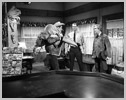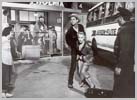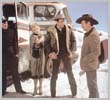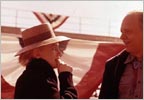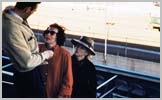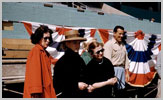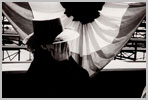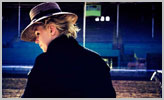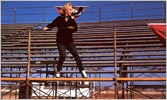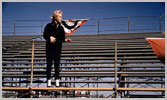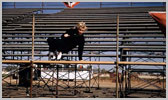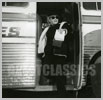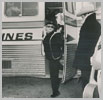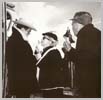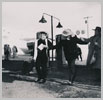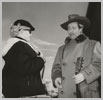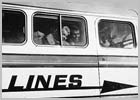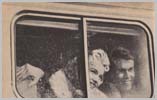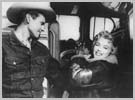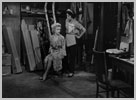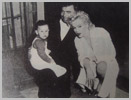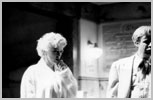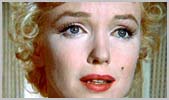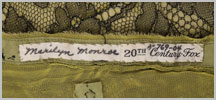
My journey ends here...
Bus Stop (1956)
Other title : "The Wrong Kind of Girl".
Posters
 ;
; ,
, ,
, ,
,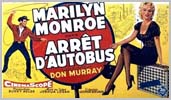 .
.
Many people think thta it was one of the best dramatic interpretation of Marilyn.
Her associate Milton Greene did a lot for the success of this movie.
John Huston, her first choice, who had already directed her in "The Asphalt Jungle", wasn't available.
Lew Wasserman suggested Joshua Logan, who agreed to lead the project when his friend Lee Strasberg assured him that Marilyn was very talented.
Marilyn was quite difficult on the set. It was not only due to the fear of a flop and to her lack of self-confidence (her endless pets hates ), but also to her growing dependence on barbiturates. She was also, for the first time, in a strong position.
Her partner, Don Murray, thought that she
wasn't always a very pleasant "boss". The only person with who she
stuck up a friendship with during the shooting, was Eileen Heckart, who
had recently played in a Arthur Miller's play "A View From the Bridge".
She gave to her character of a singer, Cherie, a stammer during the hard moments (a feature proper to Marilyn) and tending to forget her text at the important moments.
In the final version, a big part of Cherie's
monologue face to Elma Duckworth (Hope Lange) in the bus, was cut
during the montage, because Joshua Logan had suffered from pressure to
make the film shorter. Marilyn was convinced that this cut cost her an
Academy Awards nomination.
Production
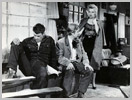 ,
,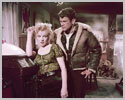 ,
, ,
,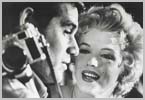 ,
,
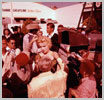 ,
,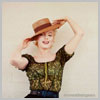 (more pics here).
(more pics here).
Rodeo
 ,
,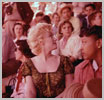 ,
, (more pics here).
(more pics here).
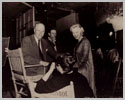 (more pics here).
(more pics here).
Bed 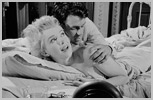 ,
,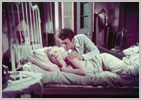 ,
, (more pics here).
(more pics here).
Fur coat
 ,
,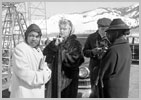 ,
, (more pics here).
(more pics here).
Leotard
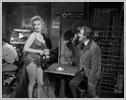 ,
, ,
, ,
,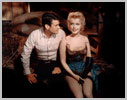 ,
, (more pics here).
(more pics here).
Off set
alone
Fur jacket
 -
-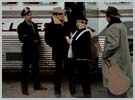 ;
;
Other pictures
Publicity pictures
green blouse
with Don Murray
alone
leotard  ,
, (more pics here).
(more pics here).
Other adverts
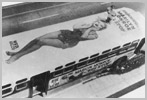 ,
,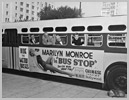 ,
,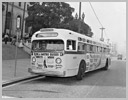
Screenplays
 -
- ;
; .
.
CREDIT
Twentieth Century-Fox, Cinémascope & colors (Deluxe)
Runtime : 96 mn.
Release date : August 31, 1956.
Director : Joshua Logan
Producer : Buddy Adler
Screenplay : George Axelrod from a play of William Inge
Photography operator : Milton R. Krasner
Music : Cyril J. Mockridge, Alfred Newman, and a song of Ken Darby
Film editing : William Reynolds.
CAST
Marilyn
Monroe - Cherie
Don Murray
- Beauregard, « Bo », Decker
Arthur
O'Connell - Virgil, « Virge », Blessing
Betty Field
- Grace
Eileen
Heckart - Vera
Robert Bray
- Carl
Hope Lange
- Elma Duckworth
Hans
Conried - photographer
Max
Showalter (alias Casey Adams) - Life magazine reporter
Henry Slate - Manager of Blue Dragon Nightclub
Terry
Kelman - Gerald
Linda Brace
- Evelyn
Greta
Thyssen - cover-girl
Helen Mayon - Landlady
Lucille Knox - Blonde on Street
Kate MacKenna - Elderly Passenger
Budd Buster - Elderly passenger
Mary Carroll - Cashier
J.M. Dunlap - Orville
Fay L. Ivor - Rodeo Usher
Phil J. Munch - Preacher
Jim Katugi Noda - Japanese Cook.
TECHNICAL CREW
Mark-Lee Kirk - art director
Lyle R. Wheeler - art director
Paul S. Fox - set designer
Walter M. Scott - set designer
William Travilla - design of the costumes
Charles LeMaire - execution of the costumes
Ben Nye - make-up
Helen Turpin - haidressing
Ben Kadish - director réalisateur
Alfred
Bruzlin - sound
Harry M.
Leonard - sound
Ray Kellog - special effects.
SYNOPSIS
Bo Decker (Don Murray) has grew up in an isolated ranch in Montana, with his guardian Virgil (Arthur O'Connell). He is unbeatable for capturing and raising the cattle, and for taming the wild horses, but, during a trip to Phoenix with Virgil, he proved himself to be full of naivety and innocence.
In Phoenix, Bo follows Virgil at the Blue Dragon Café where he mets Cherie (Marilyn Monroe), native from the Ozark mounts, who belts out "Tha Old Black Magic", in the middle of the clients vociferations. Bo intercedes and enjoins them to shut up. To thank him, Cherie gives him a kiss.
Then, we learn that Cherie plans to continue her journey to the West, to Hollywood, where she thinks that her real singer career will start.Bo is mistaken by Cherie's kiss : he thinks it's a sign and that, from then on, she is the woman of his life. Whatever Virgil's opinion, he is obsessed by the idea that he has found "his angel"
Bo tracks Cherie and wakes her by announcing that, later on the day, after the rodeo event, they will marry.
Cherie and her friend Vera (Eileen Heckart) attends to the rodeo and
sees Bo winning all the tests, stimulated by his love for Cherie, of
whom he brandishs the green scarf he has stolen to her.
Cherie realizes that Bo is serious and he really wants to carry out his completely crazy wedding plans.
Convinced that the only solution for her is to flee, she borrows some money to Virgil and runs to the bus station to leave to Los Angeles. But Bo finds her again and pushs her in the Greyhound, leaving for Montana.While Bo is asleep in the back of the bus, Cherie reveals in an affecting monologue her disappointed hopes and her chaotic life to a young passenger, Elma Duckworth ( Hope Lang in her first part).
Blocked by snowdrifts, the bus must stop for the night in the restaurant "Grace's Place". While Bo and Virgil become asleep, Cherie goes to the restaurant room, and Elma explains to everybody, that the young lady was pushed in the bus against her will, and that she must be helped to get out of this ambush.
Bo, irritated by Cherie second attempt of escape, catchs her and throws her on his shoulder to go to see the closest priest.
The bus driver, Carl (Robert Bray), has heard what was going on and offers Bo to fight with him. Against all expectation, Carl leaves Bo unconscious in the snow.
Bo is so ashamed to have been beaten that he doesn't dare to face Cherie. Virgil advices him to apologize for what he did. Cherie lets him know that he would be happier without her, because he ignores everything about her and her past.
The road has been cleared and the bus is about to leave. Shyly, Bo asks Cherie if he can kiss her before leaving her. Cherie doesn't refuse and realizes at that moment that she's deeply affected by this kiss.Bo still wants to marry her, and this time, Cherie agrees. The couple gets in the bus and waits for Virgil. But this one, understanding that his mission is fullfilled, decides to stay there.
To the Oscars
- Best Supporting Actor : Don Murray.
To the British Academy Awards
- Most Promising Newcomer to Film 1956 : Don Murray.
 BACK TO INDEX
NEXT FILE
BACK TO INDEX
NEXT FILE
